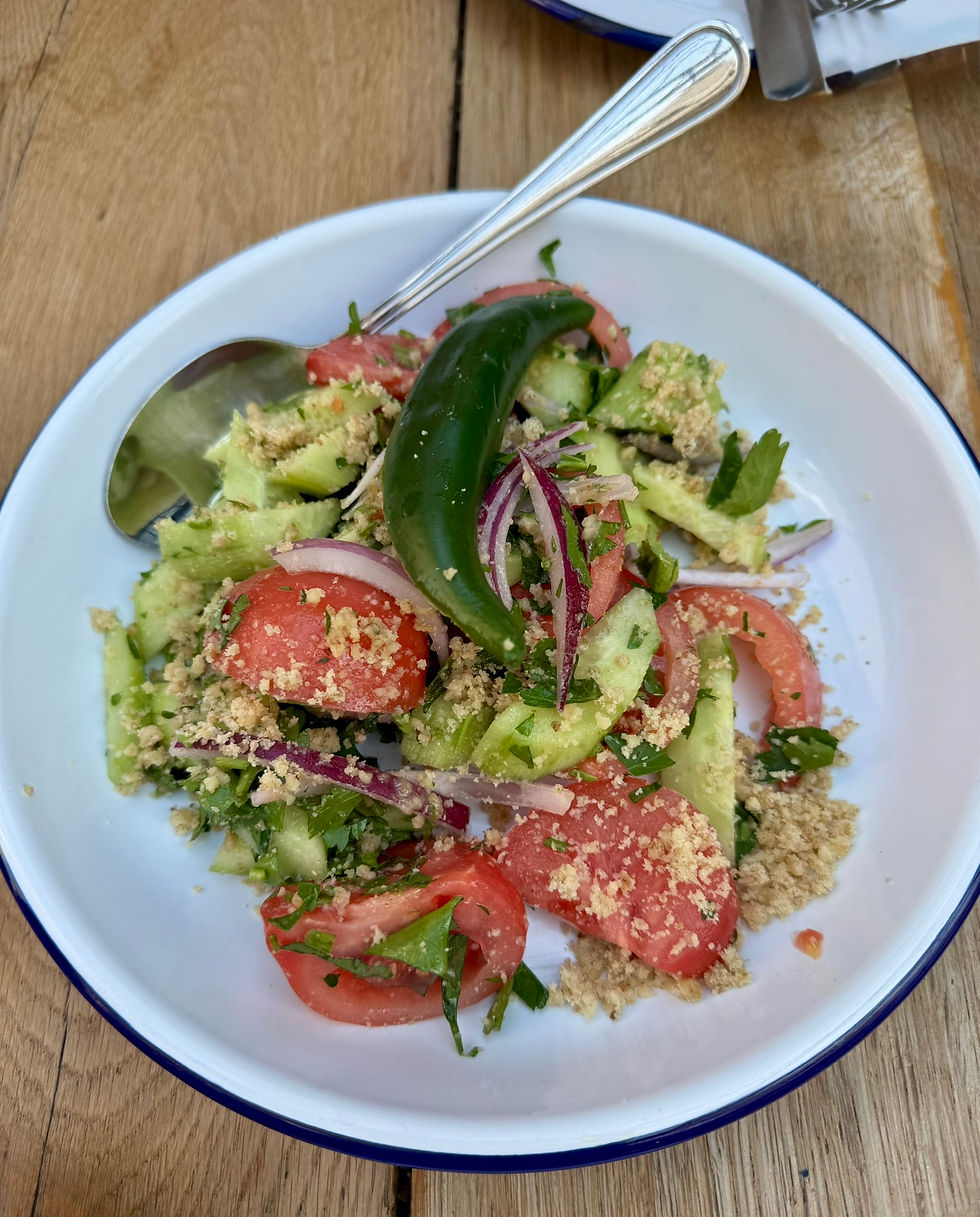Georgia: Freedom, Faith and Conversations That Stay With You
- worldculturebazaar
- Aug 22, 2025
- 4 min read
Updated: Aug 22, 2025
A few months ago, I returned from Georgia. I didn’t stand on a wine barrel, but I did talk to many people.
A Land of Ancient Faith and Harmony
Georgia was the second country after Armenia to adopt Christianity as its state religion (in 326 AD). The country was baptized by Saint Nino, a woman sent to the Caucasus by the Virgin Mary to spread Christianity. She carried a cross made of vine branches (which is why a cross is uneven), tied together with strands of her own hair. Miraculously, Nino healed both the queen and king of Georgia — and the country became a beacon of Christianity in the region.
According to our guide, there are 11,200 churches in Georgia, two of which are UNESCO-protected.
Today, in the center of Tbilisi, you can find functioning churches of five different faiths, standing side by side. Somehow, over the centuries, they’ve managed not to destroy each other.
Equality from the 12th Century
From the owner of an art gallery, I learned that Georgia’s most famous poet, Shota Rustaveli, who lived in the 12th century, wrote that men and women are equal — a truth still remembered from old school literature classes. She just shrugged when asked why this is treated like a brand-new idea nowadays. 🙂
Freedom, Friendship, and What Ifs
Freedom runs deep in Georgia’s soul. While there’s the occasional grumble about their powerful neighbor to the north, the Georgians haven’t torn down everything from the past: they’ve left standing a monument commemorating 200 years of Georgian-Russian friendship — which is constantly surrounded by crowds.
Nobody knows how things would’ve turned out if, back in 1783, Georgia’s rulers had chosen Persia over Russia for protection. The “what ifs” remain historical speculation. Meanwhile, near Georgia’s most famous ski resort, Gudauri, by the Devil’s Valley, the impressive monument still stands.
Europe? It’s Complicated.
I learned a lot of historical lessons in Georgia.
While I was there, every evening, a few hundred people would gather near the Parliament in Tbilisi — just standing around, talking. You could spot EU flags here and there. It didn’t seem like everyone was fully sold on the European idea.
As one guide put it, yes, in 2023 they issued a commemorative €8,000 note titled “Georgia – Birthplace of Wine”, but that might be as far as EU integration goes.
By the way, you can buy that limited-edition banknote, designed over six months by some of the world’s best currency designers, on eBay for $450.
History Isn't Erased Here
As much as Georgians cherish their freedom, they also deeply respect their history and culture. No one dares mess with the legacy of famous puppeteer Rezo Gabriadze — even the tables with the Cyrillic writing hasn’t been painted over :)
And when there was an attempt to rename Pushkin Street, locals pushed back.
A Rainy Moment in the Old Town
In a side street of the Old Town, I met a Ukrainian man — married to a Georgian woman and living in Tbilisi for a decade — hurriedly covering his paintings from the unexpected rain.
“Many of my relatives live in Ukraine. Everyone’s tired of the war. They just want it to end, no matter how” - admitted the Ukrainian painter.
His neighbor, Gosha, also a painter and quite into U.S. politics, was introduced to me from a balcony jutting out over the street.

Uncomfortable Conversations
On a tourist minibus, I ended up sitting next to a Jewish man from Israel, originally from Kazakhstan. His Ukrainian wife sat silently beside him.
“Putin wants the Soviet Union back,” he told me.
“Why do you think that?” I asked.
“I didn’t, before. But after October 7, after what Hamas did to women and children… I changed my mind.”
I mentioned that Palestine isn’t just Hamas.
“There’s no such nation,” he snapped. “Palestinians are just trash left behind by the Arab countries.”
After that, I remembered our guide’s rule: no politics in the car. I turned to chat with the quietest passengers instead — two women who had said nothing the entire ride.
As I suspected from their painful silence — they were from Moscow.
The Last Day
Among all the experiences I had in Georgia, the last day stood out in a quiet, meaningful way.
It began with a chance meeting — as I was locking my door for the final time, I met two men from Ossetia. Muslims, on their way to Mecca, where they planned to spend ten days in prayer. They explained that the final nights of Ramadan are the holiest.
When I asked about the association between Islam and aggression, one of them answered, quoting the Quran:
“If you kill one innocent person, it is as if you have killed all of humanity.”
Later, on my way to the airport, my driver turned out to be a third-generation Azerbaijani, a 38-year-old father of two daughters, and a citizen of Georgia. After just a brief conversation, he warmly invited me to visit his father’s village, only 50 kilometers from the Azerbaijani border. Close — but that will have to wait for another time. 🙂
And then, my final gift from Georgia came in the form of a 32-year-old bartender.
I had sworn off drinking that day — but the thought that this might be my last chance to explore Georgian wine softened my resolve. So I walked into a bar.
“Well, what do you like?”
“I usually prefer dry wines. But in Georgia, I drink what tastes good.”
The bartender — who, it turns out, had studied theology — poured me a glass of semi-sweet Askaneli. When he’s not pouring drinks at the airport, he studies psychology, and gives consultations in astropsychology.
Our conversation lingered, and so did I. The last words spoken to me in Georgia weren’t about politics, history, or even wine. They were about something much deeper.
“In every religion, God is love.”
And with that, I left.











































































Comments